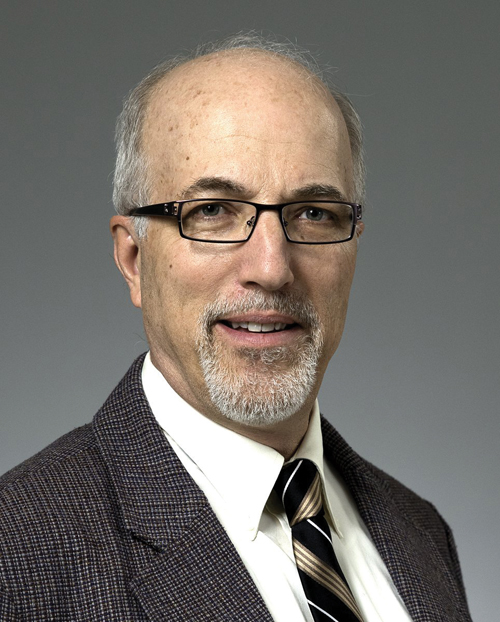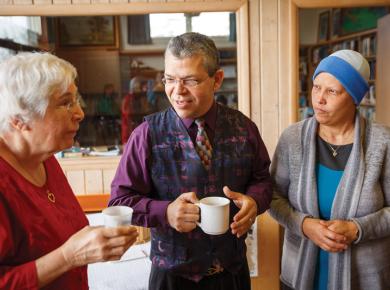Posted: September 3, 2014
How God uses relationships to build the church
The global Mennonite church is diverse and vibrant! We grieve that parts of this faith family live in areas plagued with poverty, violence or religious conflict. But the most important message Christians bring to a suffering world is hope: God cares, the followers of Jesus care and the Spirit brings healing to the nations. Already God’s salvation is beginning to transform individuals and communities, and the Mennonite church is part of that redemption project.
Diversity, suffering and hope describe the neighborhood around my congregation in Elkhart, Indiana, USA. Thousands of white, middle-class people moved away from this part of the city a generation or two ago. Into this area moved African Americans (blacks from southern parts of the United States), Latinos (immigrants from Central or South America) and other ethnic groups. There is wonderful energy in the restaurants, grocery stores, churches and music styles of the various cultural groups. But Elkhart also struggles with gangs, violence and prejudice.
Building community between blacks, whites and Latinos has not been easy – and Mennonites all over the world minister in the midst of similar ethnic and cultural diversity. New arrivals to Elkhart often come with few economic resources, modest education or limited English-language ability. Many Latinos come illegally without visas, seeking opportunity and fleeing violence or poverty in their homelands. Some live in fear of being discovered, arrested and deported. The household income of people in this part of the city is low. Public schools struggle with high turnover of students and strained budgets.
In places of suffering or fear, the church declares, “The light shines in the darkness, and the darkness has not overcome it” (John 1:5). God’s love became visible when a peasant girl named Mary gave birth and poor shepherds visited. Jesus came offering living water to a Samaritan woman, forgiving Roman soldiers, healing lepers and otherwise crossing ethnic, political and social boundaries.
Reaching across boundaries
Prairie Street Mennonite Church is a mostly white congregation with a few Latinos and blacks. We want to become more diverse and better represent the breadth of the Kingdom of God.
So it has been life-giving for our congregation to open our doors recently to a small new Latino congregation to use our building for worship. Pastor Ruben Santos and his wife Morela are from Venezuela and recently became citizens of the United States. On Friday evenings they worship in our building with twenty-five other Spanish-speakers. My wife Ellen and I, and several others from our congregation who speak Spanish join this Restauración (Restoration) group for worship.
Pastor Santos was schooled in another denomination, but is eager to learn from Anabaptists. I want to learn from his congregation about evangelism, worship and prayer. My background of carefully planned and controlled worship is different from the Pentecostal style of Restauración. Our music styles are different. But in these new brothers and sisters I sense a gracious spirit and big vision. We do not know exactly what will happen with the meeting of our two congregations. But God is up to something, and it includes the hope and joy of reaching across cultural and linguistic boundaries and finding ways to collaborate. In both of our congregations we welcome people who are homeless, single parents or undocumented.
Responding to suffering
What does it mean for the global Mennonite church to say that if “one member suffers, all suffer together with it” (1 Corinthians 12:26)? One response to suffering is for persons with skills or money to share directly with those in need. When Christians in Elkhart realized that the family of a recent shooting victim did not have money for the funeral, we gathered several thousand dollars for the burial.
Mennonite churches around the world similarly share money and resources through some kind of local mutual aid fund. In Elkhart Mennonites have paid rent or medical bills for people who are unemployed. We helped an undocumented immigrant family buy and renovate a house. Some members have opened their homes to women who seek safety from an abusive marriage relationship.
Jesus speaks to the causes of suffering
Such direct aid is important and necessary, but it is not enough. Those with greater wealth are tempted to continue to control, for their own benefit, the economic or political systems that created the gulf between rich and poor. If unjust economic or political patterns persist in society, an occasional gift to those in need might make the giver feel good without changing the causes of poverty.
Jesus came to save all humankind, including the wealthy. But he was born in a stable, among the poor, in a country plagued with violence. His mother Mary praised God who “brought down the powerful from their thrones, and lifted up the lowly,” who “filled the hungry with good things, and sent the rich away empty” (Luke 1:52, 53). Jesus launched his ministry by declaring that God sent him “to bring good news to the poor . . . and recovery of sight to the blind” (Luke 4:18). In other words, Jesus became flesh to proclaim hope in the midst of society’s brokenness.
Can the fellowship and sharing that happen through Mennonite World Conference be good news both for parts of the church where there is poverty and where there is material abundance? Through our global interaction, can persons blessed with material resources recover sight to see the great gulf between rich and poor? Might we also see the opportunity this gulf creates for God to change our hearts and build a stronger global church?
The Mennonite world has changed
In recent decades the momentum of Mennonite spiritual and numerical growth has shifted from Europe and North America – where Mennonites first flourished – to Africa, Latin America and Asia. God’s activity often is most evident in places where there is not material abundance. Persons at the political or economic margins of the world are more likely to receive and live into the gospel than those who feel secure at the centers of economic power.
MWC provides a way to respond
There are at least three ways that MWC can help me and other North American Mennonites respond to suffering or economic injustice at home and elsewhere in the world.
First, MWC builds understanding through relationships that cross political, racial and economic barriers. When we know and love people who are in very different life circumstances, we can pray with empathy. The spiritual vitality and vision for mission in economically or politically stressed parts of the church can inspire Mennonites elsewhere.
Some of us will meet face-to-face at a MWC Assembly, or when Mennonites travel to visit another country. Such interaction is most productive when all participants expect to learn from the other rather than simply impart something. How does the witness of Christians in another part of the world challenge me to grow and change?
Second, understanding motivates us to act. When we know and love someone who suffers, we want to help. The twenty-one year-old nephew of an immigrant woman in my congregation died recently in the desert in southeastern United States, trying to cross the border without documents. That tragedy motivates me to speak and act for a change in immigration laws in my country. It makes me want to speak up about corporations that move their factories to Central or South America where they can pay unethically low wages.
Third, and finally, action can inspire us to invest in the church. Anabaptists emphasize that Christians are citizens of the Kingdom of God above any other national or ethnic loyalty. Being part of MWC reminds me of this allegiance, and gives a way to put it into practice. Even Mennonites in a distant country are no “longer strangers and aliens, but . . . citizens with the saints and also members of the household of God” (Ephesians 2:19). My highest priority is to invest time and resources in the church of Jesus Christ. Because it is my spiritual home, I especially want to connect to the Mennonite Church.
Stay connected through MWC
Go to the MWC website and learn about the International Missions Association, a group of twenty-two Anabaptist mission groups whose representatives met recently in Singapore. Learn about Mennonites from several continents who are collaborating with Mennonites in the Democratic Republic of Congo and Burkina Faso to promote sustainable agriculture projects. See a video about Mennonites in Paraguay providing childcare for single mothers so they can seek employment.
Consider establishing a sister relationship with a Mennonite congregation elsewhere in the world. Plan to attend the MWC Assembly in Harrisburg, Pennsylvania, USA, in 2015, or give money to help someone else attend. Contribute your proportionate share to MWC so this networking organization can remain strong. Above all, pray for sisters and brothers in other parts of the world. In this small but vibrant Mennonite part of the Kingdom of God, we get a foretaste of the salvation, freedom and justice that someday will cover the earth. God is using MWC to strengthen the global church.
 Nelson Kraybill is lead pastor at Prairie Street Mennonite Church in Elkhart, Indiana, USA, and president-elect of Mennonite World Conference.
Nelson Kraybill is lead pastor at Prairie Street Mennonite Church in Elkhart, Indiana, USA, and president-elect of Mennonite World Conference.

Comments: